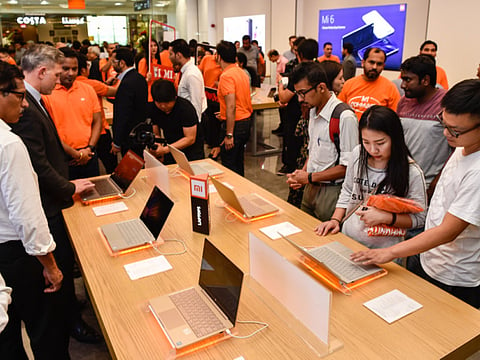Xiaomi opens its second Mi store in Dubai with over Dh3m investment
Smartphone sales rise 60% year on year in UAE, Task says

Dubai: Chinese technology company, Xiaomi, is focusing on brick and mortar stores to boost its sales after suffering setbacks at the hands of local competitors over the past two years.
The firm was the top seller in China in 2014 and 2015 but lost ground to Huawei, Oppo, Vivo and Apple last year.
This year, the company has moved back into the top five ranking worldwide in the third quarter shipments with the strongest gain, doubling its sales to 27.6 million units, driven mainly by success in India, according to research firm International Data Corporation.
The Chinese smartphone maker, that was once the most valuable start-up in the world, is making a major push into old-fashioned retail by opening its second Mi (the abbreviation and the logo of Xiaomi Inc.) Home store in Dubai at Deira City Centre in partnership with its regional distributor, Task.
The company opened the first Middle East outlet at BurJuman Centre, Dubai, in August this year with an investment of more than Dh2 million.
Ravi Matthew, deputy CEO and General Manager of Task, told Gulf News that they will be opening three more stores next year — one at Sharjah City Centre by February, one at Dubai Mall by April and one in Abu Dhabi.
He said the company has invested more than Dh3 million for the 350-square metre outlet at Deira City Centre.
“The store is not meant to generate sales from the store. It is part of the brand-building exercise. Many connect Xiaomi with only mobile phones so we are showcasing the entire line-up of Xiaomi products,” he said.
He said that sales have increased 60 per cent year on year in the UAE as the brand is being recognised by the young and tech-savvy people.
“The market is looking high technology products at an affordable price point and there is where Xiaomi comes in,” he said.
The Chinese company plans to build 1,000 “Mi Home” stores globally by 2019 and aims to ship 100 million smartphones next year. Right now, it has more than 200 stores.
While the company is best known for phones, it has invested in 77 start-ups and now offers air purifiers, drones, TVs, speakers, TV set-top boxes, electric cycles, robots and robot vacuum cleaners.
Matthew said that offline sales will be quite significant for the company.



